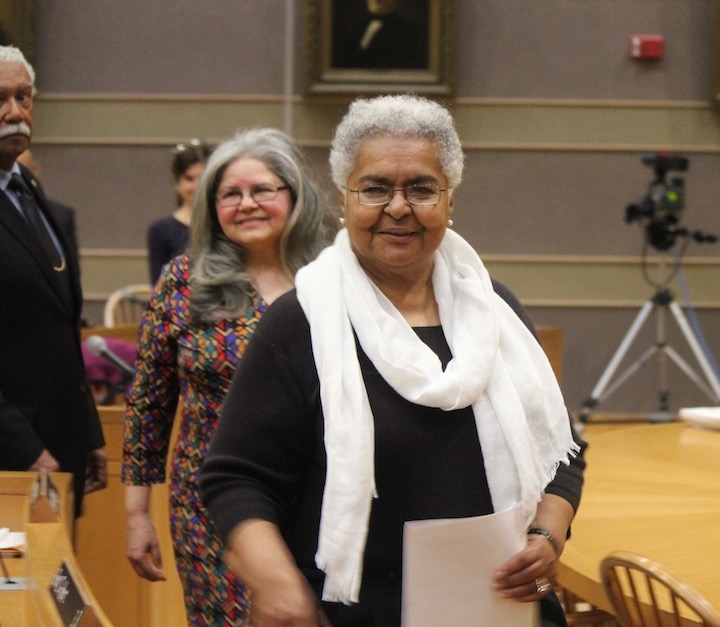
Markeshia Ricks Photo
Colon being escorted into the aldermanic chambers Monday night.
New Haven is a majority-minority city where being a person of color can make finding a job that pays a living wage elusive, and an affordable safe place to live non-existent.
But the city is making strides toward changing that, even if that takes time.
That was the New Haven Board of Alders Black and Hispanic Caucus take on the State of the City, as delivered by Hill Alder Dolores Colon Monday at City Hall.
Colon, who serves as the caucus chair, said in the annual caucus address that though the nation as a whole is currently enjoying low unemployment rates in the 3 percent range, black and brown communities are still plagued with double-digit unemployment.
She noted that four years ago she stood in the Aldermanic Chamber at City Hall to declare that New Haven was facing a jobs crisis. She said not much has changed.
“When employers are seeking applicants for vacant positions, there must be a common perception that the minorities are unskilled and lacking in higher degrees in education,” she said. “The number of residents in minority communities registered at New Haven Works clearly disproves that.”
She said thousands of New Haven residents have the skills and requisite education and technical background to work in the city. She called on Yale University to make good on a promise to hire at least 500 of them at livable wages.
When large local employers honor such commitments, Colon said, it means more people who can work in the city instead of commuting. More parents work fewer jobs, which means more participate in parent-teacher organizations and other civic pursuits, and more spend time at home keeping up their property and contributing to the local tax base.
Colon said the caucus will continue to press large employers like Yale to honor such promises.
“It’s our responsibility as leaders to make sure that this much-needed change happens,” she said.

Emma Jones, who received a shoutout from Colon.
She pointed out that alders prioritized the work of establishing an Affordable Housing Task Force that produced recommendations for how to increase the city’s affordable housing stock. Colon said now that that work is done, the city has to work to implement those recommendations and has to let developers know that the city expects more than market rate housing.
“Our caucus demands that when developers come to an urban center with a number of different income levels, the needs of the community must be reflected in the development,” she said, drawing hearty applause. “This is our responsibility as elected officials: to make sure we have clean and safe places to live.
“As a city, we can’t afford to have another 66 Norton St.,” she added to more applause, referring to an apartment complex that the city deemed too dangerous to live in, requiring the evacuation of 80 tenants. She pointed to a part of the Hill-to-Downtown project going up on Gold Street as an example of the kinds of developments of which the city needs more.
Colon praised the recent re-establishment of a stronger Civilian Review Board (CRB). She recognized Emma Jones, who spearheaded a 20-plus year effort to establish a CRB with the power to hold cops accountable for misconduct.

Colon: No handouts; a hand up.
Colon said the CRB will strengthen the relationship between the community and police, providing another layer of transparency that could go a long way in ensuring that the community is “policed with dignity and respect.”
To Jones, she said, “your strength and courage is remarkable, you have empowered the community in so many ways and we can never repay you for your tireless work.”
The predominately black and Hispanic sections of the city “want to be vibrant, clean and safe places like other parts of the city. It’s all of our responsibility to ensure that this happens,” Colon said.
“We don’t want a handout. We want a hand up so we can contribute just as much as other parts of the city do.”